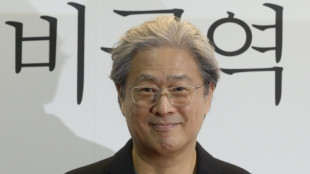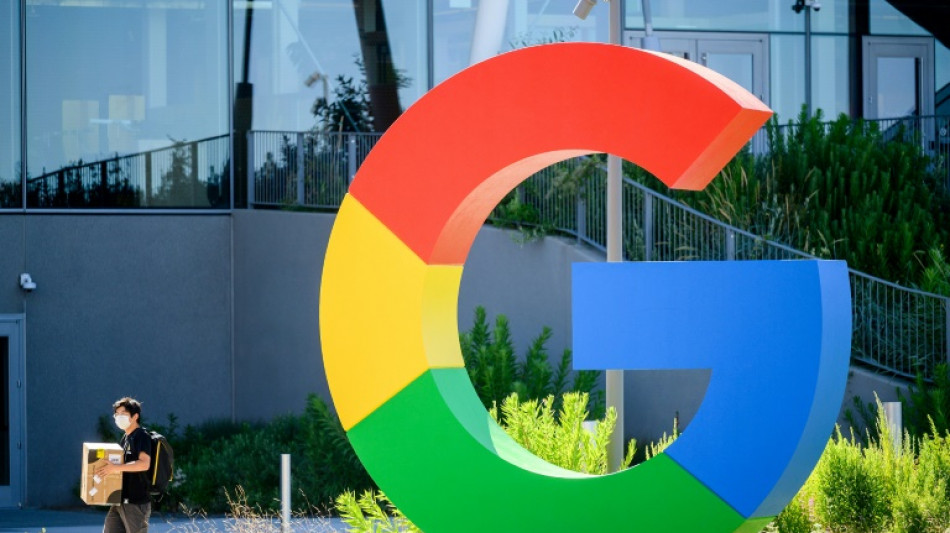
-
 Chinese rookie Wang grabs LPGA lead at storm-hit TPC Boston
Chinese rookie Wang grabs LPGA lead at storm-hit TPC Boston
-
US appeals court finds Trump's global tariffs illegal
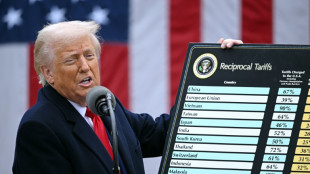
-
 Sounders out to 'prove a point' against Messi's Inter in Leagues Cup final
Sounders out to 'prove a point' against Messi's Inter in Leagues Cup final
-
'Trans' neo-Nazi shakes up gender debate in Germany

-
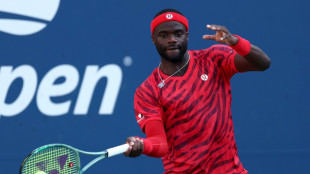 Tiafoe bounced out in US Open third round
Tiafoe bounced out in US Open third round
-
Argentina police carry out raids in
Milei sister graft probe

-
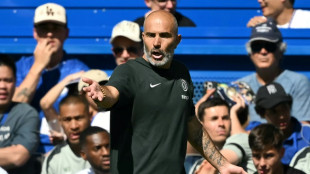 Maresca won't ban Chelsea players from social media
Maresca won't ban Chelsea players from social media
-
US Spirit Airlines files for bankruptcy again

-
 Amorim expects to stay at Man Utd as pressure mounts
Amorim expects to stay at Man Utd as pressure mounts
-
Alcaraz romps into US Open fourth round, injured Shelton exits

-
 Mussolini's great grandson hails winning Serie A debut with table-toppers Cremonese
Mussolini's great grandson hails winning Serie A debut with table-toppers Cremonese
-
Shelton quits US Open with shoulder injury
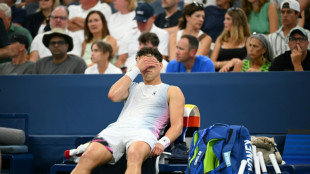
-
 In whirlwind tour, Qatari royal commits $70bn to southern Africa
In whirlwind tour, Qatari royal commits $70bn to southern Africa
-
St Pauli upstage Hamburg in derby return

-
 Trump moves to cut more foreign aid, risking shutdown
Trump moves to cut more foreign aid, risking shutdown
-
Hearing ends without ruling on Trump attempt to oust Fed Governor Cook
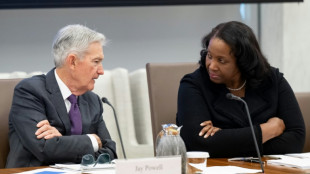
-
 Europeans tell Iran offer on table to avoid sanctions
Europeans tell Iran offer on table to avoid sanctions
-
FA Cup-holders Palace sign Spain winger Pino

-
 Alcaraz romps into US Open fourth round, Rybakina advances
Alcaraz romps into US Open fourth round, Rybakina advances
-
Alcaraz mows down Darderi to reach US Open last 16
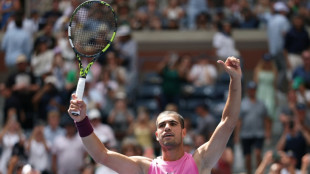
-
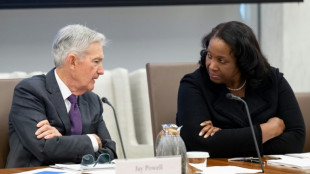 Court battle underway as Fed Governor Cook contests firing by Trump
Court battle underway as Fed Governor Cook contests firing by Trump
-
Schwarber hits historic four homers but misses rare shot at five

-
 Injury doubt Tonali picked by Gattuso for Italy's World Cup qualifiers
Injury doubt Tonali picked by Gattuso for Italy's World Cup qualifiers
-
Spurs sign Dutch midfielder Simons in boost for new boss Frank

-
 Rybakina routs Raducanu to advance at US Open
Rybakina routs Raducanu to advance at US Open
-
US banana giant Chiquita returns to Panama

-
 Martin says Rangers remain supportive despite woeful start
Martin says Rangers remain supportive despite woeful start
-
Stocks slide as US inflation clouds rates outlook
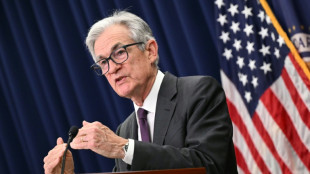
-
 Smog then floods: Pakistani families 'can't catch a break'
Smog then floods: Pakistani families 'can't catch a break'
-
US to refuse visas to Palestinian officials at UN summit on state

-
 Ayuso triumphs in Vuelta stage seven, Traen keeps red jersey
Ayuso triumphs in Vuelta stage seven, Traen keeps red jersey
-
Goalkeepers still posing problems for Man City boss Guardiola
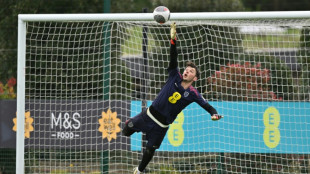
-
 Turkey bars Israeli ships, flights from its territory
Turkey bars Israeli ships, flights from its territory
-
Forest boss Nuno plans Marinakis talks after transfer issues

-
 Putin will have 'played' Trump if he refuses to meet Zelensky: Macron
Putin will have 'played' Trump if he refuses to meet Zelensky: Macron
-
Norris sets early pace at Dutch Grand Prix practice

-
 Bargell tackles medical challenge and starts for US at Women's Rugby World Cup
Bargell tackles medical challenge and starts for US at Women's Rugby World Cup
-
Vardy in talks to sign for Serie A outfit Cremonese: source

-
 Trump withdraws Kamala Harris's Secret Service protection
Trump withdraws Kamala Harris's Secret Service protection
-
Arteta concerned by Saka injuries after latest hamstring blow

-
 Red Cross says number of missing people surging
Red Cross says number of missing people surging
-
Tuchel apologised to Bellingham over 'repulsive' blast

-
 Garnacho arrives at Chelsea as £40 m move from Man Utd moves closer
Garnacho arrives at Chelsea as £40 m move from Man Utd moves closer
-
Iran has executed at least 841 people this year: UN

-
 'Sometimes I want to quit' says troubled Man Utd boss Amorim
'Sometimes I want to quit' says troubled Man Utd boss Amorim
-
German neo-Nazi heads for women's jail after gender change

-
 Crystal Palace to face Dynamo Kyiv, Strasbourg in Conference League
Crystal Palace to face Dynamo Kyiv, Strasbourg in Conference League
-
Japan pledges $68 billion investment in India
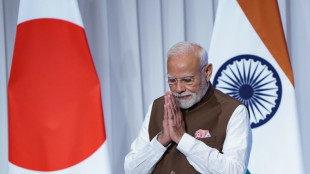
-
 Europa League draw throws up Forest rematch with Malmo
Europa League draw throws up Forest rematch with Malmo
-
Rooney reckons 'something is broken' at Amorim's Man Utd


Big Tech defends landmark law in US Supreme Court
The US Supreme Court on Tuesday will consider a law that since 1996 has protected tech companies from lawsuits related to content posted on their platforms.
The nine justices will examine a case related to the November 2015 attacks in Paris and their ruling, expected by June 30, could have huge repercussions for the future of the internet.
The case stems from a complaint against Google filed by the relatives of Nohemi Gonzalez, one of the 130 victims of the attacks in the French capital.
The US citizen was studying in France and was murdered at the Belle Equipe bar by attackers from the Islamic State group.
Her family blame Google-owned YouTube for having recommended videos from the jihadist group to users, helping along the call to violence.
According to the family, "by recommend[ing] ISIS videos to users, Google assists ISIS in spreading its message and thus provides material support to ISIS," a legal brief said.
The complaint was dismissed by the federal courts on behalf of a law, known as Section 230, which was passed when the Internet was in its infancy and has become one of its pillars.
Section 230 states that in the US internet companies cannot be considered publishers and have legal immunity for the content posted on their platforms.
The novelty of the Gonzalez case is that the complainants are isolating algorithms as the cause of the harm, arguing that the highly complex recommendation systems perfected by big platforms fall out of the scope of Section 230.
"The selection of the users to whom ISIS videos were recommended was determined by computer algorithms created and implemented by YouTube," the Gonzalez family legal brief said.
The Supreme Court passes over the vast majority of the cases that come its way, and hearing this one indicates there is a willingness to modify the landmark law.
- Big tech cold sweat -
The prospect of the Supreme Court even tinkering with Section 230 is causing cold sweats in the tech world.
In the legal filing, Google pleaded that the court "not undercut a central building block of the modern internet."
"Recommendation algorithms are what make it possible to find the needles in humanity's largest haystack," Google said.
Allowing platforms to be sued for their algorithms, "would expose them to liability for third-party content virtually all the time," said Facebook owner Meta in its own brief, adding that recommendations serve to organize uploaded content.
On Wednesday, the top court in the US will continue its consideration of a very similar case, but this time asking if platforms should be subject to anti-terrorism laws.
In the past, several of the Supreme Court justices have expressed a willingness to move the lines on Section 230, which is increasingly contested given the backlash against big tech in recent years.
In 2021, the very conservative Clarence Thomas lamented that "many courts have construed the law broadly to confer sweeping immunity on some of the largest companies in the world."
Lawmakers in US Congress are very politically divided and unable to pass legislation that would update a law that was enacted when Facebook founder Mark Zuckerberg was 11 years old and Google did not exist.
Given the deep political divide, it therefore seems likely that the Supreme Court will move the lines faster than Congress.
But for now, "nobody knows exactly how," said Tom Wheeler, an expert at the Brookings Institution think tank. "That's why it's important to see how the hearing goes," he told AFP.
A.Gasser--BTB



